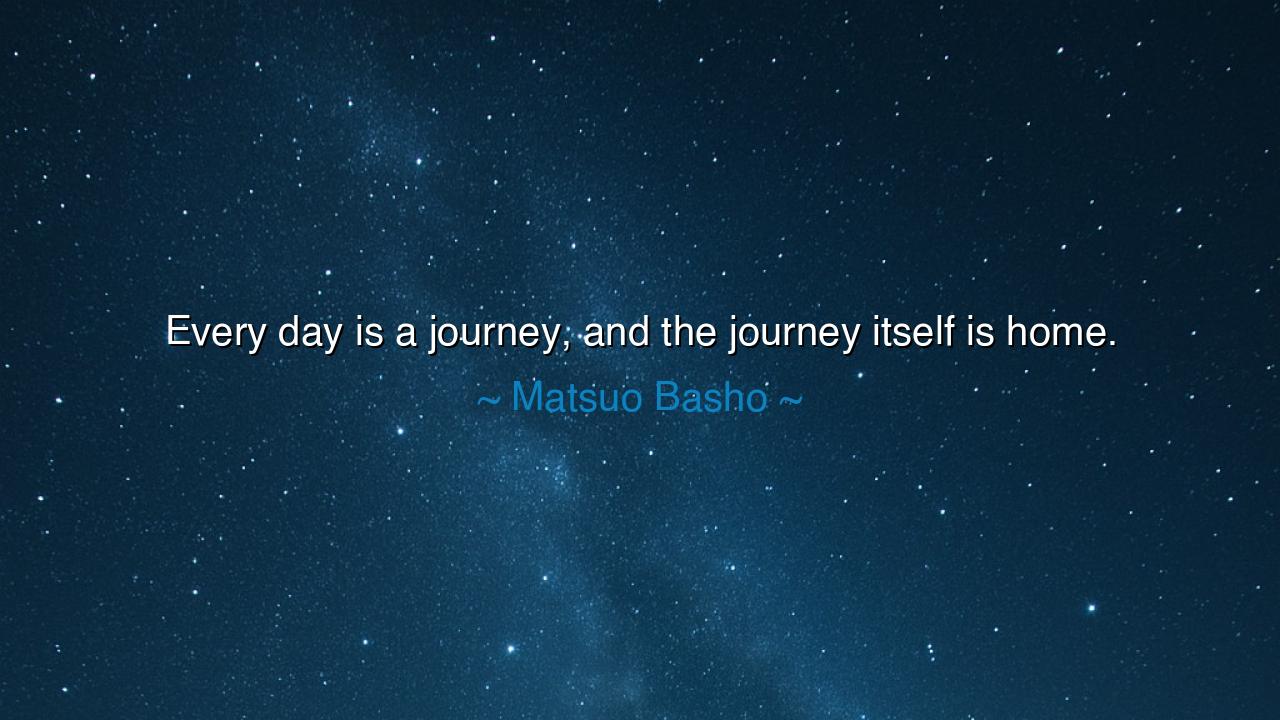
Every day is a journey, and the journey itself is home.






“Every day is a journey, and the journey itself is home.” So wrote Matsuo Bashō, the wandering poet of Japan, whose haiku and prose became lanterns of stillness for generations to come. In these simple yet eternal words lies the wisdom of a life lived close to nature, and to the heart of impermanence. Bashō teaches that existence is not a destination to be reached, but a road to be walked — and that within the motion and uncertainty of the path, one may find peace. For him, the journey itself is home, because the soul that accepts transience has already arrived.
The origin of this quote flows from Bashō’s own life, which was one long pilgrimage through the mountains, rivers, and villages of 17th-century Japan. He left behind the comfort of teaching and city life to travel as a monk-poet, carrying little but ink and faith. His journeys were not driven by ambition but by awakening — to experience the sacred in the ordinary, to see in each passing moment the mirror of eternity. He slept beneath the stars, walked through storms, and spoke with farmers and monks alike. In every fleeting sight — a frog leaping into a pond, a blossom drifting down a stream — he saw the reflection of life’s impermanence and beauty. From such moments was born his philosophy: that home is not a place of permanence, but the presence of peace within motion.
To say “Every day is a journey” is to awaken to the reality that life itself is a pilgrimage. Each morning we rise to walk paths unseen, each breath carrying us further along the road of being. Some days the road is smooth, and others, it wounds our feet. Yet Bashō teaches that both joy and sorrow are part of the same journey, each revealing another face of the truth. The one who complains of the road’s trials has forgotten its purpose; the one who walks it with gratitude understands that every step, however difficult, is sacred.
There is an ancient parallel to this wisdom in the life of Odysseus, the wanderer of Greek legend. His voyage home from Troy took ten long years, filled with storms, monsters, and temptation. Yet though he longed for Ithaca, it was the journey itself that forged his soul — every challenge tempered his courage, every loss deepened his understanding. When at last he reached his home, he was not the same man who had set sail. Thus, even the great Odysseus embodies Bashō’s truth: that the road itself transforms us, and in that transformation, we find our truest dwelling.
Bashō’s insight also speaks to the restless heart of the modern soul — the one forever seeking satisfaction in some distant “arrival.” Many today live as if happiness waits at the next milestone: the next job, the next love, the next achievement. But Bashō whispers across the centuries that home is already here, within this very moment. The wind through the leaves, the scent of tea, the warmth of breath — these are not distractions from life’s purpose; they are life’s purpose. To see them clearly is to awaken to the quiet miracle of being.
In his final journey, Bashō fell ill on the road and died far from his birthplace. Yet even in his last moments, he wrote verses about the path before him, as if death itself were simply another bend in the road. His final haiku reads: “On a journey, ill — my dreams wander over the withered fields.” There was no fear in him, for he had long understood that the road does not end; it merely changes shape. To the one who has made the journey his home, even death becomes another form of travel, another step toward the infinite.
So, my traveler of life, hear this teaching: do not hurry toward tomorrow, nor cling to yesterday. Walk the path before you with open eyes and a grateful heart. Let each day be enough — the laughter, the tears, the silence, the motion — for they are the very materials from which wisdom is built. Wherever you go, go fully; wherever you stand, stand wholly. For as Matsuo Bashō taught through his life and his words, the destination is not the goal — the journey is. And when you learn to rest within the journey itself, you will find that you have been home all along.






AAdministratorAdministrator
Welcome, honored guests. Please leave a comment, we will respond soon